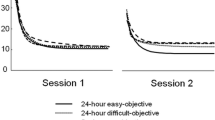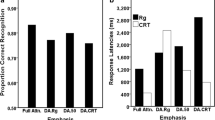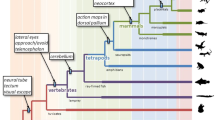Abstract
Previous work has suggested that conscious error awareness may fluctuate with levels of attention. Here, we explore this relationship by showing that error awareness can be impaired when exogenous support to attentional systems is reduced by decreasing task demands. Twenty participants performed a manual Go/No-Go response-inhibition task optimized to examine error awareness. In one condition (Immediate), participants were asked to respond as quickly and as accurately as possible to each Go stimulus, and in the other condition (Delayed) they were asked to time their responses to the offset of the stimulus, thereby decreasing task difficulty and imposing a more automated response set. As expected, speeding increased the error rate. However, contrary to the expectation (and to participants’ subjective reports) that speeding would impair awareness of performance, we found the opposite to be true: errors were more likely to be unnoticed when the task was easier. We suggest that this tradeoff reflects two qualitatively different types of errors arising from the different cognitive demands of the Immediate and Delayed conditions. We propose that unaware errors reflect pure lapses of sustained attention and are therefore more susceptible to changes in task demands, while aware errors mostly reflect failures to inhibit responses, and are therefore most susceptible to increased response speed.

Similar content being viewed by others
Notes
The internal validity of these estimates was verified by asking participants to list reasons for their unawareness. The most listed reason was a failure to pay attention.
References
Arnsten AF, Contant TA (1992) Alpha-2 adrenergic agonists decrease distractibility in aged monkeys performing the delayed response task. Psychopharmacology 108:159–169
Beck DM, Rees G, Frith CD, Lavie N (2001) Neural correlates of change detection and change blindness. Nat Neurosci 4(6):645–650
Bekker EM, Overtoom CC, Kooij JJ, Buitelaar JK, Verbaten MN, Kenemans JL (2005) Disentangling deficits in adults with attention-deficit/hyperactivity disorder. Arch Gen Psychiatry 62(10):1129–1136
Coull JT, Middleton HC, Robbins TW, Sahakian BJ (1995) Clonidine and diazepam have differential effects on tests of attention and learning. Psychopharmacology 120:322–332
Hart T, Giovannetti T, Montgomery MW, Schwartz MF (1998) Awareness of errors in naturalistic action after traumatic brain injury. J Head Trauma Rehabil 13(5):16–28
Hester R, Foxe JJ, Molholm S, Shpaner M, Garavan H (2005) Neural mechanisms involved in error processing: a comparison of errors made with and without awareness. Neuroimage 27(3):602–608
Logan GD, Schachar RJ, Tannock R (1997) Impulsivity and inhibitory control. Psychol Sci 8:60–64
Manly T, Owen AM, McAvinue L, Datta A, Lewis GH, Scott SK et al (2003) Enhancing the sensitivity of a sustained attention task to frontal damage: convergent clinical and functional imaging evidence. Neurocase 9(4):340–349
Nieuwenhuis S, Ridderinkhof KR, Blom J, Band GP, Kok A (2001) Error-related brain potentials are differentially related to awareness of response errors: evidence from an antisaccade task. Psychophysiology 38(5):752–760
O’Connell RG, Dockree PM, Bellgrove MA, Kelly SP, Hester R, Garavan H et al (2007) The role of cingulate cortex in the detection of errors with and without awareness: a high-density electrical mapping study. Eur J Neurosci 25(8):2571–2579
O’Keeffe FM, Dockree PM, Moloney P, Carton S, Robertson IH (2007) Characterising error-awareness of attentional lapses and inhibitory control failures in patients with traumatic brain injury. Exp Brain Res 180(1):59–67
Prigatano GP, Schacter DL (1991) Awareness of deficit after brain injury: clinical and theoretical issues. Oxford University Press, New York
Robertson IH, Manly T, Andrade J, Baddeley BT, Yiend J (1997) ‘Oops!’: performance correlates of everyday attentional failures in traumatic brain injured and normal subjects. Neuropsychologia 35(6):747–758
Rock I, Linnett CM, Grant P, Mack A (1992) Perception without attention: results of a new method. Cognit Psychol 24(4):502–534
Simons DJ, Chabris CF (1999) Gorillas in our midst: sustained inattentional blindness for dynamic events. Perception 28(9):1059–1074
Smith A, Nutt D (1996) Noradrenaline and attention lapses. Nature 380:291
Sturm W, Willmes K (2001) On the functional neuroanatomy of intrinsic and phasic alertness. Neuroimage 14:S76–S84
Stuss DT, Murphy KJ, Binns MA, Alexander MP (2003) Staying on the job: the frontal lobes control individual performance variability. Brain 126(Pt 11):2363–2380
Acknowledgments
We would like to thank Dr. Michael Gormley for his advice on the statistical analysis. We are also grateful to Dr. Paul Dockree for his helpful comments and support.
Author information
Authors and Affiliations
Corresponding author
Rights and permissions
About this article
Cite this article
Shalgi, S., O’Connell, R.G., Deouell, L.Y. et al. Absent minded but accurate: delaying responses increases accuracy but decreases error awareness. Exp Brain Res 182, 119–124 (2007). https://doi.org/10.1007/s00221-007-1054-5
Received:
Accepted:
Published:
Issue Date:
DOI: https://doi.org/10.1007/s00221-007-1054-5




